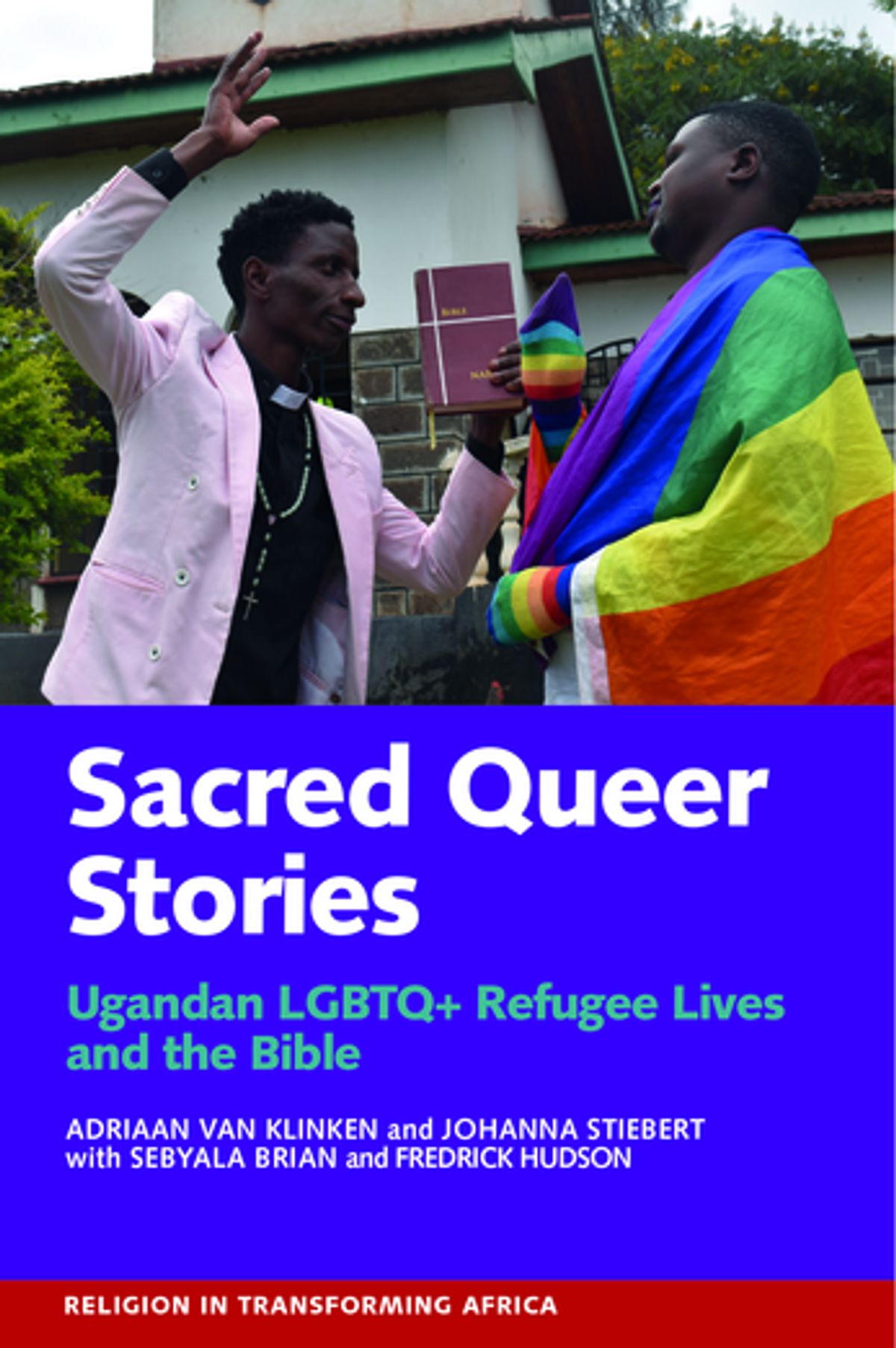Q&A with Johanna Stiebert and Adriaan van Klinken about their new book, Sacred Queer Stories.

We are delighted to announce the publication of a new book: Sacred Queer Stories: Ugandan LGBTQ+ Refugee Lives and the Bible, by Adriaan van Klinken and Johanna Stiebert with Sebyala Brian and Fredrick Hudson (Religion in Transforming Africa series). Woodbridge, Suffolk/Rochester, NY: James Currey, 2021.
How has this book come about?
In the aftermath of the passing of the Anti-Homosexuality Bill in Uganda (2013), LGBT Ugandans began to search for safety and better living conditions. Many of them crossed the border to neighbouring Kenya, where they entered the slow process for resettlement elsewhere with the United Nations refugee agency (UNHCR). While in Kenya, these refugees live in difficult conditions and struggle to make ends meet. Our book documents some of their stories and brings them into dialogue with biblical stories.
The book is an output of a research project funded by the British Academy/Leverhulme Trust Small Research Grant scheme. It was initiated by the friendship between two of the co-authors, Adriaan and Raymond (who is publishing under their given name, Sebyala Brian). Both collaborated on an earlier research project in Kenya, also in the area of gender, sexuality and religion. The aim of this new project was to work on stories: on the one hand, the life stories of Nairobi-based Ugandan LGBTQ+ refugees awaiting resettlement, and on the other, Bible stories, which enjoy a vibrant and varied reception on the continent of Africa. Woven together these two sets of stories have created a body of new stories. The aims of this are multiple: to sanctify and to queer stories, to create new stories, to forge bonds between different peoples using the shared medium of the Bible, and to re-story the Bible and life stories through creative and liberatory means. Alongside the authors, each of whom brought something important and distinctive to the project, the project involved many current and former members of The Nature Network, a Nairobi-based community organisation run for and by Ugandan LGBTQ+ refugees. Friendships started this book and friendships were forged and consolidated through the process of this book’s formation.
What is the key argument that your book develops?
The key argument is that both Ugandan LGBTQ+ refugee lives and the Bible are sacred and queer. One way this is shown is through the twelve life stories presented in Part I, each of which responds to the question of what sacred texts mean to the Ugandan LGBTQ+ story tellers. The book acknowledges that the Bible has been used to vilify and harm LGBTQ+ persons and other disadvantaged groups (the socio-economically deprived, women, refugees…) in Kenya and elsewhere; but it also demonstrates that Bible stories can be liberating and empowering. The book responds in new ways, and adds to, existing queer African archives, and queer African biblical studies. In the course of this, Part II of the book describes a hermeneutics of trust and the process of inter-reading Bible stories and life stories. This book tells stories, advocates the importance and transformative potential of stories, and shows the academic value of stories. It benefits from the lived insights of Sebyala Brian and Fredrick Hudson, both of whom are Ugandan, LGBTQ+, and community activists, with first-hand experience of refugee life in Kenya, as well as from the academic expertise of Adriaan, who is Professor of Religion and African Studies, and Johanna, a Professor of Biblical Studies.
What insight does the book provide into the relationship between religion and public life?
Religion is usually associated with the politics of homophobia in Africa. Yet our book illustrates the significance of sanctity and of religion (above all Christian religion but also Muslim faith) for Ugandan LGBTQ+ refugees in Kenya. Moreover, it demonstrates how sacred texts can be inter-read with life stories to create new stories and to empower, liberate and talk back to religiously fuelled homophobic hate speech. In terms of the dimension of ‘religion’, the book focuses most closely on two biblical stories: the story of Daniel in the Lions’ Den (Daniel 6 in the Hebrew Bible, or Old Testament), and the story of Jesus and the Woman Caught in Adultery (John 8 in the New Testament). In terms of public life, the focus is also discrete, and centred on Ugandan refugees sustained by the community-based organisation The Nature Network, which was, at the time of data gathering, located in Matasia, on the outskirts of Nairobi. The book demonstrates: first, that religion infuses public life in distinctive and multiple ways, and second, that the Bible can be reclaimed by marginalised communities as a site of meaning, healing, and empowerment. The creative appropriation and re-telling of biblical stories allows the participating LGBTQ+ refugees to speak back to public discourses or religious homophobia, and to use the Bible to give meaning to their life experiences, struggles, hopes, and dreams.
Give us one quote from the book that you believe will make us go and read it?
Can we have two?
“I grew up where everything I was reading in the Bible and everything I was taught in the church – or, let’s say, 70 per cent – was against my flow of life, against my nature, against my being, against my experience.” (Doreen)
“…the Bible is an influential popular cultural text, the significance of which is not limited to the religious sphere narrowly defined, but extends to the realms of community organising, social activism, and creative and performative arts. …[B]uilding on traditions of storytelling in feminist, postcolonial, and queer scholarship, this book has provided a methodology of life storytelling vis-à-vis the stories in canonised scriptures, thus exploring new ways in which storytelling can be utilised to signify marginalised lives and creatively to produce knowledges of resistance. Here’s to more African sacred queer stories to be told!”
